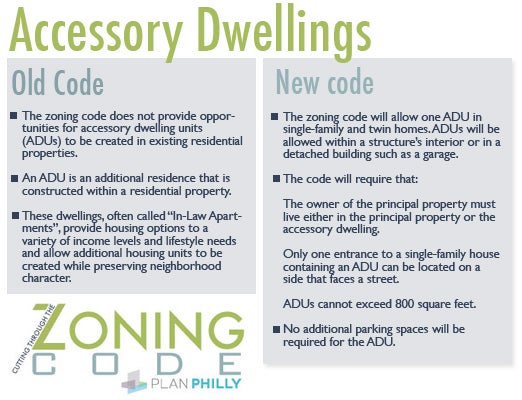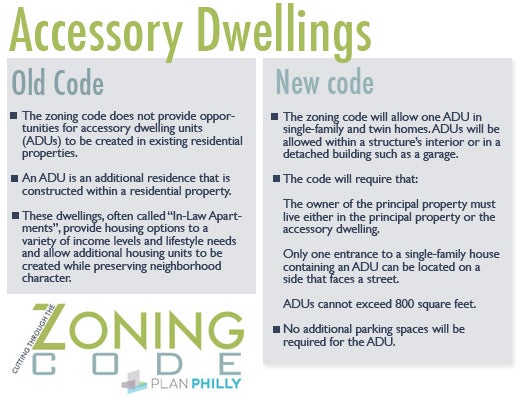A new housing class in the zoning code meets with controversy

What could aging possibly have to do with zoning? According to Kate Clark, a planner with the Philadelphia Corporation for Aging (PCA), the needs of older city residents were never addressed in the city’s zoning code.
“There wasn’t any mention of ‘senior,’ ‘elder,’ ‘older person.’ There was no mention” in the code whatsoever, Clark said.
That might be a problem. According to PCA’s director of research and evaluation, Alan Glicksman, Philadelphia’s population is aging. One of the city’s most rapidly growing demographic groups is adults over the age of 85.
“Philadelphia will have a disproportionately large population of older people for some time,” Glicksman said. “Housing the elderly is housing a good chunk of the population. They’re not just frail. They want to be active parts of the community. It benefits the older person, but it can also benefit the neighborhood. Part of that is contingent on them being able to live safely in the homes they currently reside in.”
The PCA advocated that the revision of the zoning code include a new class of housing called an Accessory Dwelling Unit, or an ADU. According to the code revision, no more than one ADU would be permitted on lots of detached single homes or twin homes. Each unit would be limited to 800 square feet, and the deed would be amended to require that the owner of the property would be required to occupy one of the units.
“We have an aging population and larger homes that that people are unable to support,” said Eva Gladstein, the executive director of the Zoning Code Commission. “It’s a way to use [these homes] without creating a duplex. The size is prescribed, there’s not a second door [on the street front], and the owner must live there.”
According to Glicksman’s research, approximately 173,000 Philadelphians over the age of 60 own their own homes, and three-fourths of them hope to stay in their homes for at least another decade. But a quarter of those homeowners reported limited mobility, and nearly half found it difficult to pay their housing expenses.
“What I see are people who are isolated in their own homes,” said Susan Klein, director of housing for the PCA. “They don’t have enough money to support their homes, but have a tremendous amount of unused housing. [ADUs] allow them to have people nearby, and get an income.”
Not everybody is a fan of adding rental units to single-family homes. As PlanPhilly reported last month, some residents and civic associations in Northeast Philadelphia have repeatedly expressed concerns about ADUs. City Councilman Brian J. O’Neill, a member of the Zoning Code Commission whose district encompasses a large swath of the Northeast, has raised objections as well.
“It’s a solution looking for a problem,” O’Neill told PlanPhilly after Wednesday’s meeting of the ZCC.
Deborah Howe is a professor at Temple University, where she chairs the Department of Community and Regional Planning. She argued that the problem is already here. In the national population, Howe said, seniors are “going to be one in five soon. Eighty percent own their own home, and those 65-plus have been in the same place [an average of] 25 years.”
One of Howe’s research focuses is ADUs, and she has studied their use in a variety of cities and towns, including Seattle and Portland. She said the concern that the character of neighborhoods will change is overblown. “A lot of people worry that [owners] will run out and create units,” Howe said. “That simply doesn’t happen.”
In Portland, Howe said, the city did not include even the owner-occupancy provision when it decided to allow widespread construction of ADUs. Portland’s ADUs, including apartments inside an extant structure or as an addition to a building, as well as freestanding units like those included in the Philadelphia draft code. Before the revision, according to Howe, the city received about 40 requests each year to construct ADUs. After the revision, the requests increased to 80, and even without a requirement, 90 percent of the permit requests were for owner-occupied properties.
“You gotta trust the landowner,” Howe said.
But in Philadelphia, where the outdated code has been bent on a regular basis, trust may be in short supply. As written, the blanket provision for ADUs in Philadelphia will permit them to be constructed on any lot occupied by single detached houses and twin houses. While he expressed concern about integrating ADUs into the zoning code, O’Neill said he does not necessarily object to the units in all cases.

“We can design the code for a hardship use, or overlay it if the neighbors want it,” O’Neill said. “It builds a whole lot of trust into the system that doesn’t exist in the real world.” O’Neill worries that L&I won’t be able to enforce the owner-occupied provision. He offered the example of professional uses of residential homes. Doctors, dentists, and lawyers are allowed to practice out of their own home, provided they live there.
“I had a case recently [in my district],” O’Neill says, “in a rowhome – not on a corner – the middle of a block. A doctor buys a house and his practice is high-volume. He’s moved from a commercial space,” thus bringing commercial activity to a residential block that has not seen it previously, “and he’s legal.”
The analogy was not exact – new residential units are unlikely to bring a similar volume of traffic to a block – but O’Neill’s point was that L&I does not have the resources to stake out this rowhouse for a week to ensure that the doctor actually lives in the home he purchased for his business.
The councilman said that he would prefer to address ADUs in the remapping phase, which he said would better control their use and make the provision more enforceable. In the meantime, he and Gladstein separately told PlanPhilly that they hoped the issue would not distract from what they see as the real achievement of the ZCC: honestly reassessing the zoning needs of the city.
Contact the reporter at ngilewicz@planphilly.com
WHYY is your source for fact-based, in-depth journalism and information. As a nonprofit organization, we rely on financial support from readers like you. Please give today.



